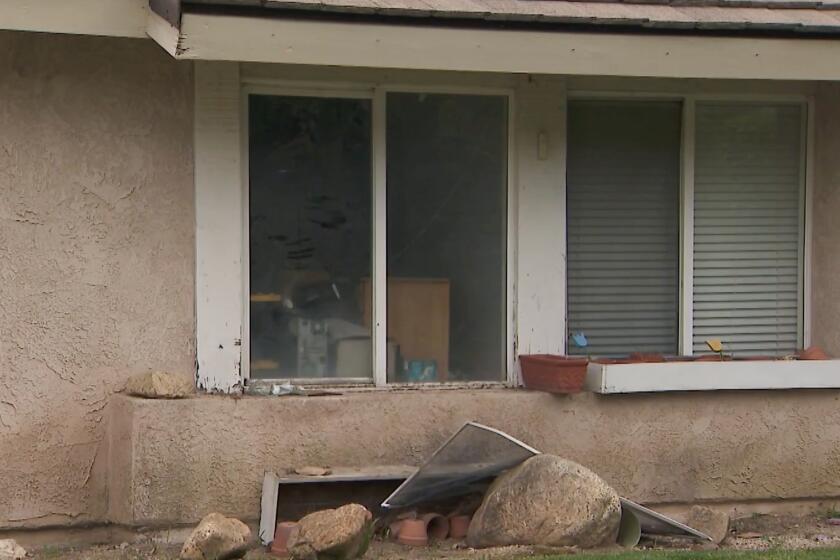O.C. Delegation Leans Toward Air Plan
The Bush Administration’s plan to clean the nation’s air appears to blend enough elements of flexibility with traditional government regulation to satisfy Orange County’s conservative members of Congress, whose districts are smothered by some of the worst air in the nation.
“The recognition that we have to move (on the issue of air pollution) is so profound . . . that I’m hopeful that before the end of the year, we’ll be gathered for a bill-signing ceremony at the White House,” said Rep. William E. Dannemeyer (R-Fullerton), the senior member of the county’s delegation.
Support from the county’s Republican representatives is an encouraging sign for the President, according to one Orange County lobbyist, because it suggests that Bush’s pollution-control plan may not run into stiff opposition from lawmakers who traditionally fight proposals for increased government regulation and expensive government initiatives.
Lobbying Group
“The more nonpartisan you can make an issue, the greater the chances that it will move ahead,” said Thane A. Young, an associate of the Ferguson Co. The Washington-based lobbying group represents the Irvine Co. and the city of Santa Ana, among other clients.
However, Young and others noted that the politics of air pollution has often depended more on local air quality than on political ideology.
Dannemeyer acknowledged that the air-pollution package that emerges from Congress may not strongly resemble the one outlined by the President on Monday. But he said the final plan is likely to retain many elements of the Bush proposal.
Among other things, the Bush plan would reduce by 40% the standard for tailpipe emissions of hydrocarbons, which help create ozone, a major ingredient in smog.
But it would also allow auto manufacturers and refinery operators to determine for themselves how best to meet overall standards for pollution reduction set by the federal government. In addition, industrial polluters would be required to use the “best-available technology” to reduce emissions.
The proposal would extend to the year 2010 the deadline for meeting federal air quality standards for Orange County and the Los Angeles basin, which together constitute one of the nation’s most heavily polluted areas. Under amendments to the Clean Air Act passed in 1977, the region was to have met pollution standards by the end of 1987.
“There is a reasonableness in this bill that didn’t appear in past bills,” said Brian Bennett, chief of staff for Rep. Robert K. Dornan (R-Garden Grove).
Other clean-air proposals, such as a recent bill proposed by Rep. Henry A. Waxman (D-Los Angeles), “caused conservatives who are worried about the environment to say, ‘We need a more flexible approach to avoid scaring off new businesses and closing existing businesses,’ ” Bennett added.
A spokesman for Rep. Ron Packard (R-Carlsbad), the only Orange County representative to co-sponsor the Waxman bill, said Packard believes that elements of both the Bush and Waxman plans merit consideration.
“The congressman embraces the idea that something needs to be done, whether it’s Waxman’s plan or the President’s plan,” said David R. DuBose, Packard’s press secretary.
Dannemeyer and Dornan had both opposed Waxman’s bill because they believed that its proposed sanctions were too strict.
“I don’t want to be a part of a law that is so stringent in its application that that we’re saying to the people of Southern California: ‘You’re not going to be able to hook up any new water meters,’ which stops growth, or, ‘You’re denied your pro-rata share of highway funds,’ ” Dannemeyer said.
Backed by Environmentalists
Environmentalists have argued that such strong measures are needed if Southern California’s skies are ever to be clear of smog.
In an interview last week, before Bush’s plan was unveiled, Rep. C. Christopher Cox (R-Newport Beach) called for the Administration to create financial incentives akin to some of those outlined Monday by the White House.
“The idea is to generally mandate industrywide reductions in pollution and allow firms more flexibility to meet the standards,” Cox said. “As a matter of general philosophy, it is important that the government take an active role in controlling air pollution. The best way for the government to do that is to try to use market forces rather than to thwart them.”
Rep. Dana Rohrabacher (R-Lomita) declined comment on the Bush plan, saying that he and his staff wanted to study it before making any statement.
More to Read
Start your day right
Sign up for Essential California for news, features and recommendations from the L.A. Times and beyond in your inbox six days a week.
You may occasionally receive promotional content from the Los Angeles Times.






